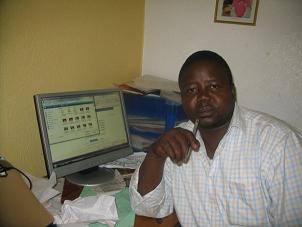How Do You Solve A Problem Called Cote D’Ivoire?
No sooner had the people of Africa, and especially Guineans let a sigh of relief, for successfully sleep-walking their way out a major blood bath, than the leaders of Cote D’Ivoire, like in a 4×4 relay race, seized the baton to keep the continent’s perennial disease in season. Two weeks ago, Africa held its breath and contemplated the seemingly inevitable outcome of a fiercely contested re-run election in Guinea. Like Guinea, it is the glaring similarities with Cote D’Ivoire that make one question the level of political sanity, if any, which remains on our continent. (Photo: Abdulai Mansaray [Zoztik Mayanga], author)
Guinea’s recent political gridlock saw how a country toyed with the idea of self-destruction. Today, we are faced with another, bent on self-disintegration. The similarities between these two countries can be mistaken for a microcosm of the continent at large. As a common factor, both share the same colonial masters. Like most African countries, the battle lines are not drawn along political ideologies, manifestoes or even nomenclature. This one seems to take tribal and religious persuasions, among others. The current political standoff between Laurent Gbagbo, the incumbent and Allassane Quattara is a reflection of how deep the continent remains bogged in political quagmire.
An election has just been conducted in the country, and initial results gave a clear victory to Allassane Quattara, though fraught with the usual accusations and counter-accusations of fraud; a major ingredient of Africa’s political broths. Laurent Gbagbo has contested the validity of the result and had it overturned by the Constitutional Council, which he appointed. The impasse has left the country with two governments, each with its own group of cabinet ministers, appointed simultaneously in the same country; talk about political Siamese. The situation in Cote D’Ivoire makes the marriage between Mugabe and Morgan Tsvangarai look like child’s play.
The country has been divided into the north and south for some time, with the Muslim dominated north supporting Quattara. Quattara, who has the backing of the Muslim dominated north, also enjoys the nod from most western governments. However, he has been dogged by questions over his foreign parentage; a political race card that Laurent Gbagbo had wasted no time exploiting to generate maximum lack of trust for his opponent. The country was led to independence by the late Felix Houphouet-Boigny. Following his death in 1993, it has witnessed its fair (pardon the euphemism) share of political instability; characterised by coups, rebel wars and widespread breakdown of the political infrastructure. The image of Cote D’Ivoire as a model of stability had since been subjected to political fissures, which culminated into the country being divided into the rebel –controlled and the civilian ruled regions.
The recent election was a result of long drawn political haggling and auctioneering. It even took the efforts of people like Didier Drogba; one of the country’s most well known exports to make a personal plea for peace. This election was therefore, not only a welcome relief to a people recovering from war fatigue, but was also seen as a peace deal that will return the country to some political sanity and stability. Instead it has been plunged into a political abyss and legal wrangling that have come to define the African political landscape. This is a perineal African disease that requires in large parts, an African driven solution. It is therefore laudable to know that Thabo Mbeki of South Africa and President Ian Khama have expressed unreservedly, their utter condemnation of Laurent Gbagbo’s antics.
The view that the current impasse in Cote D’Ivoire threatens regional stability has also been reiterated by the European Commission President, Manuel Barroso. It is a view that has been echoed by the EU’s Foreign Policy chief spokesman Catherine Ashton. These condemnations are welcome. Sadly, the international committee has reverted to the same old tactics of gun boat politics and threats with sanctions. International banks and lenders have threatened to freeze out aid deals if Cote D’Ivoire does not resolve its political crisis. In a statement issued recently, they said that they “will continue to closely monitor developments and reassess the usefulness and effectiveness of our programmes given the breakdown of governance” In English, it means “we will withdraw our aid if you don’t put your political doll houses in order.” Such prescriptions usually result in economic sanctions.
When will the western world learn that this threat and tactics to use sanctions as a way to force leaders to toe the line does not work? These sanctions against countries always generate additional suffering for the people. It is the same people they intend to protect, that ironically bear the brunt of the effects of sanctions. Sanctions are a tried and tested tool that has never worked in the African context, when you consider that most of Africa’s leaders have the conscience of a chainsaw. When will the western governments and their aid giving communities learn that most of these leaders are less interested in the welfare of their people? With or without sanctions, these leaders will continue to live their pampered lifestyles. These sanctions will not deprive their refrigerators of the chilled champagnes and canapés. Ironically, the subsequent hardship that sanctions unleash on the ordinary man has been used by these leaders to their advantage. In Iran for example, its leaders have used the effect of sanctions to blame the same western governments for all its economic woes, and have successfully continued to fester hatred for western governments, especially the USA. Rather than make these leaders unpopular, sanctions have served as the rally cause of popular support for the same unruly rulers.
If Cote D’Ivoire is to move from the brink of such a catastrophe, it will need all the collective diplomatic and political muscle of the African Union, if there is one. Laurent Gbagbo seems to have been comparing notes with Mugabe, who after losing the election in Zimbabwe, cunningly and deceitfully succeeded in clinging on to power by default. He should not be allowed to do a Mugabe. Since good fences make good neighbours, Laurent Gbagbo should look over to Guinea and do the honourable thing. In the interest of his countrymen, he should accept, respect and honour the will of the people and step down. As said earlier, Cote D’Ivoire has had its own brush with wars, coups and rebellions. The price of such megalomania should not be measured in Ivorian blood.
By Abdulai Mansaray (Zoztik Mayanga)
Stay with Sierra Express Media, for your trusted place in news!
© 2010, https:. All rights reserved.






